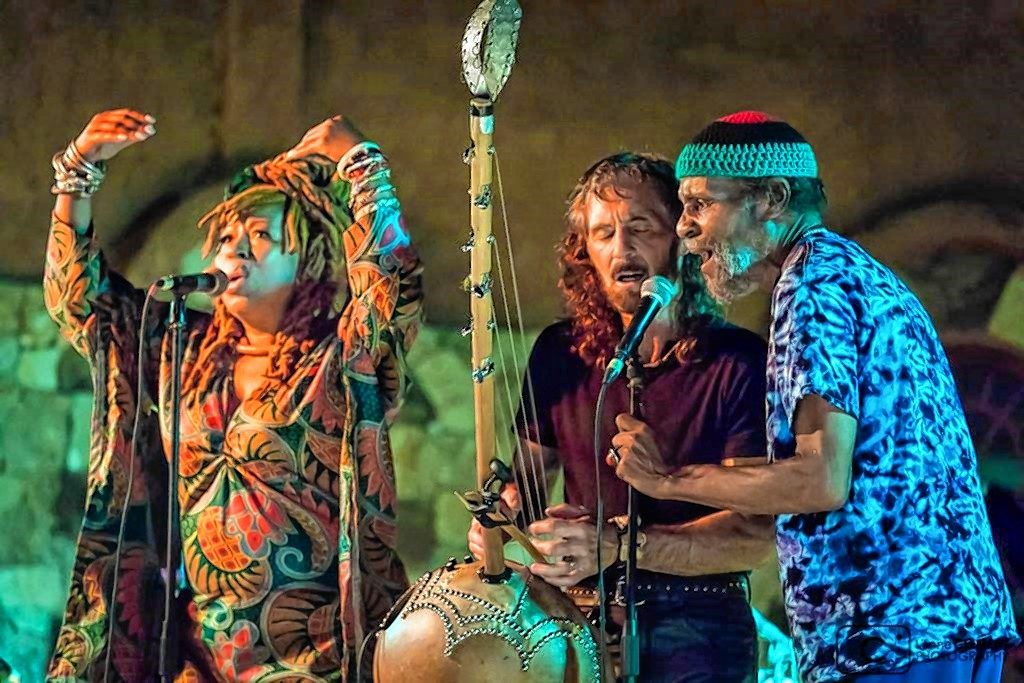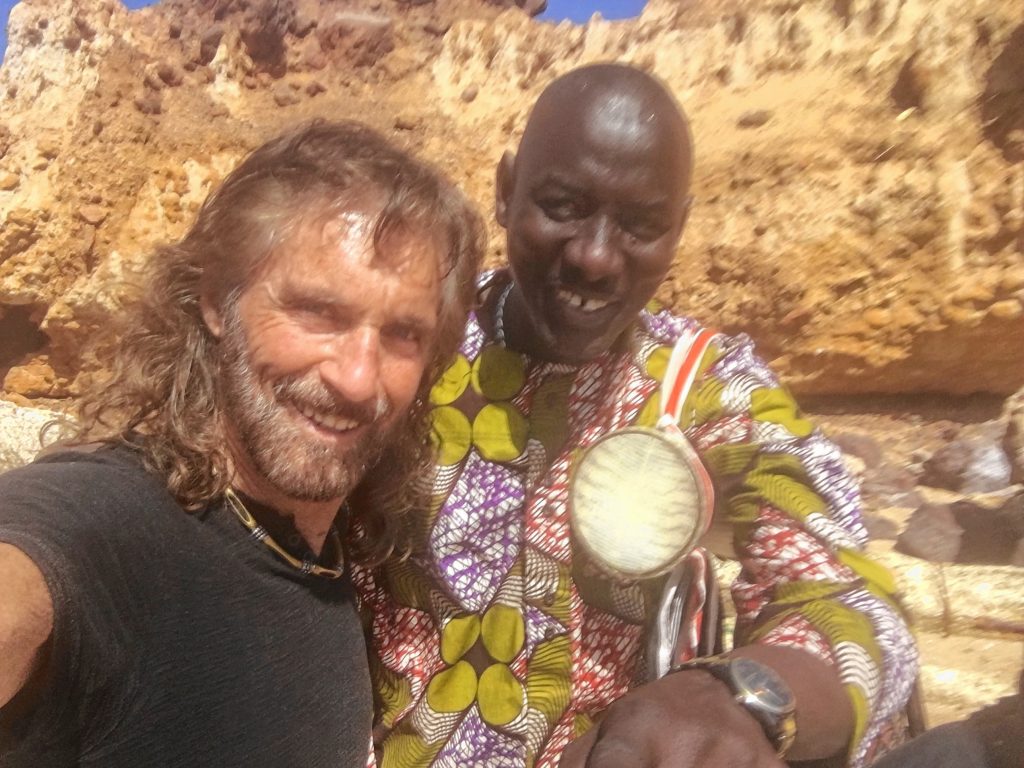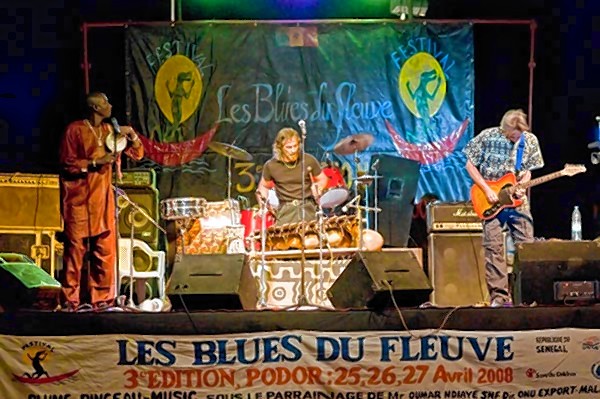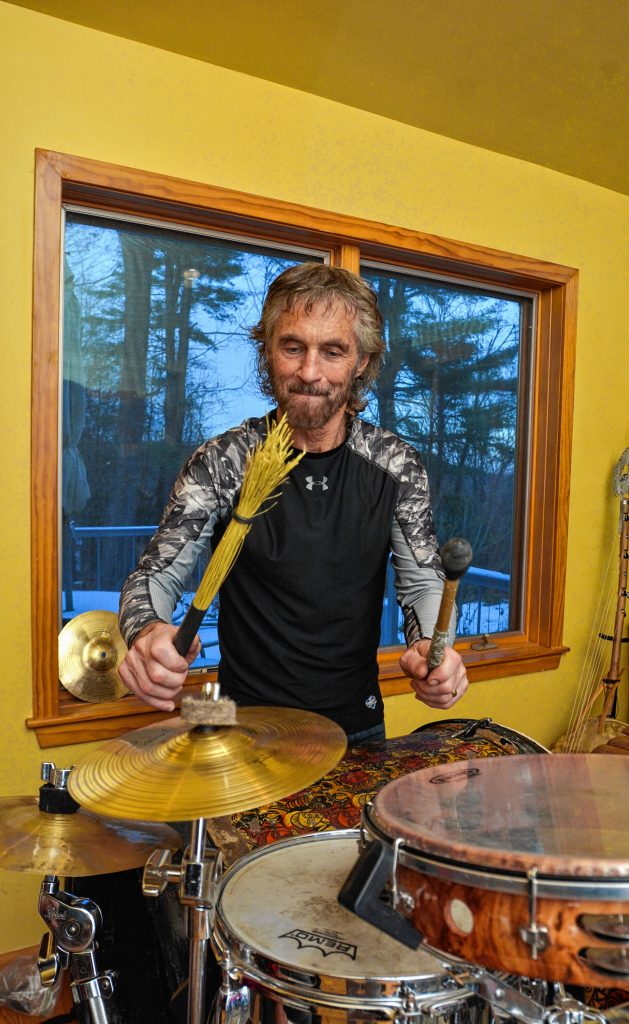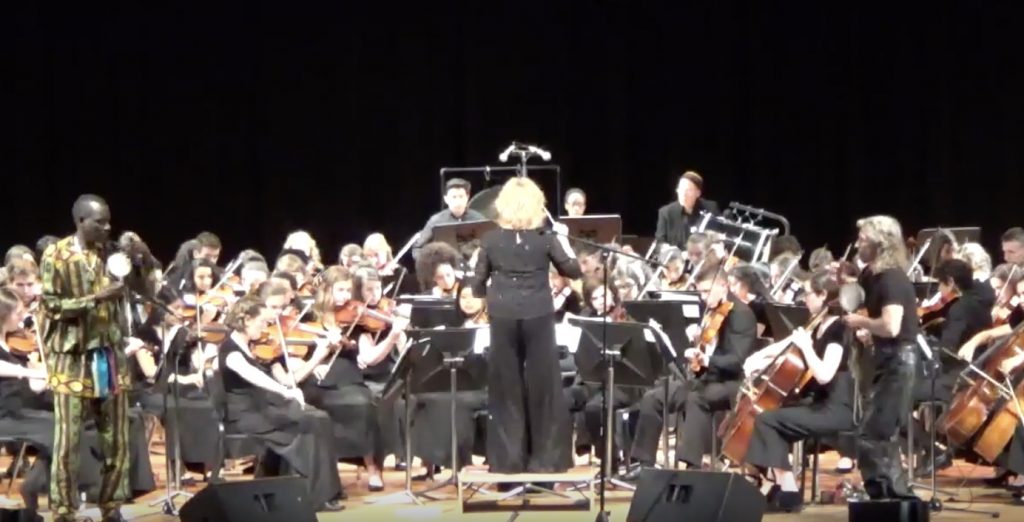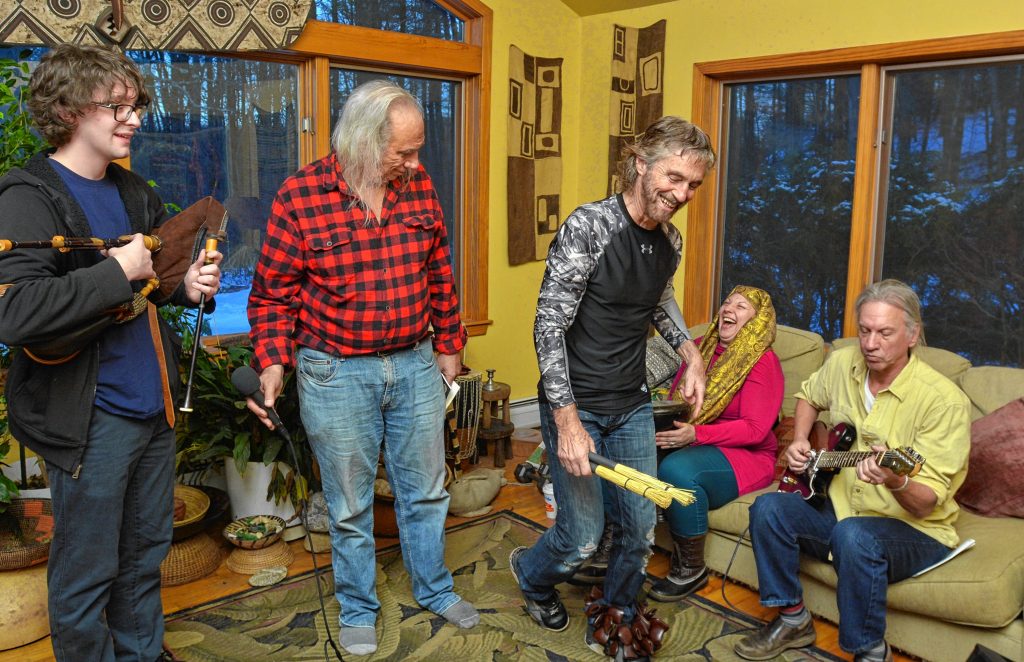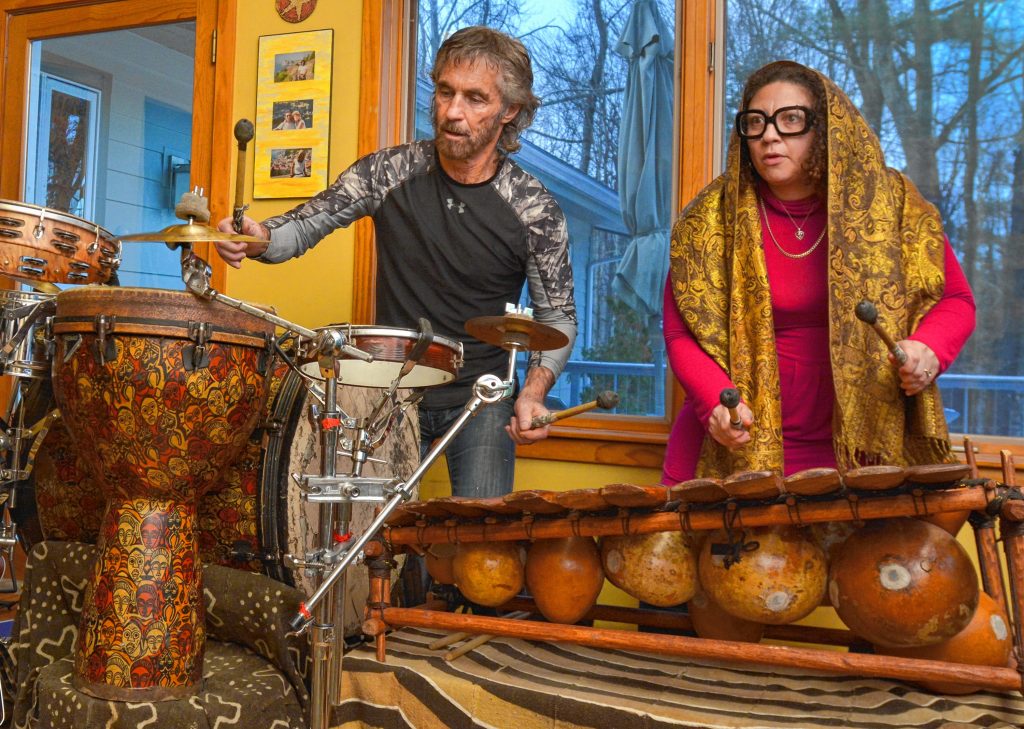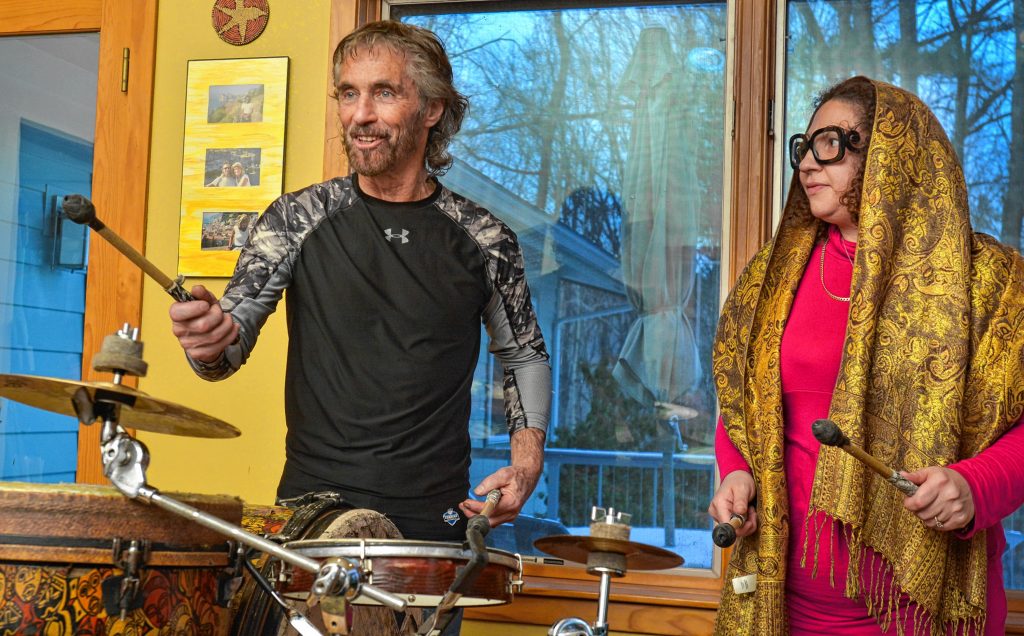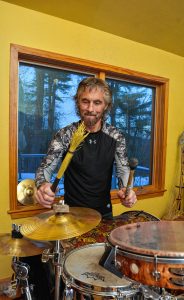When he looks back on more than two decades of forging connections with musicians in Senegal, playing with them both there and in the United States, longtime Valley percussionist Tony Vacca laughs, shakes his head in wonder, and summarizes the situation like this:
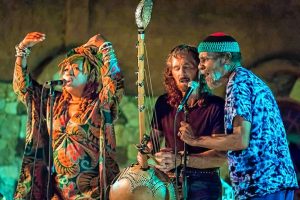
Tony Vacca with New York poets/spoken word artists Tantra Zawadi, left, and Abiodun Oyewole at the Festival Rythmes et Formes du Monde in Senegal. Courtesy photo
“Boy born in Kearny, New Jersey, to Italian immigrant parents winds up playing drums in West Africa and they’re calling his name — no, we didn’t see this coming.”
Strange tale, maybe, but it’s true. And Vacca, who lives in Whately and has made his home in the area since attending the University of Massachusetts Amherst in the late 1960s, seems like the physical embodiment of his basic mission: to use music to bring people together, create greater understanding of different cultures and traditions, and address basic social needs such as education and health. The former gymnast, who came to UMass on a gymnastics scholarship, is 69 but still lithe and athletic, still radiating the kind of energy you’d see in someone half his age.
For over 20 years, Vacca has been visiting schools throughout the Northeast and in other parts of the country to demonstrate the kinds of drum rhythms and beats he’s learned in West Africa, and how they connect to the American music he first began playing: jazz, blues, rock and roll. He makes some of those trips on his own, but many are with West African musicians and other artists he’s forged bonds with and brought to the U.S., performers who are big names in countries like Senegal, such as drummer Massamba Diop, singer/composer Mamadou Ndiaye, and dancer Abdou Sarr.
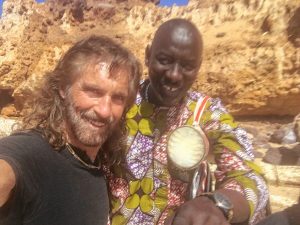
Tony Vacca with Senegalese drummer Massamba Diop, whose playing can be heard on the soundtrack of “Black Panther” and who has visited many U.S. schools with Vacca as part of the Senegal-America Project. Courtesy photo
He’s also toured and recorded with some of these musicians and his own band, the World Rhythms Ensemble, and he’s made many trips to West Africa to play and record there: Senegal, Ghana, Mali, and other countries. Now he’s doing it again: He and several other players and artists from New England and New York City left for Senegal just before Christmas for a two-week stay that was slated to include a raft of projects, including collaborative recordings with Senegalese musicians, filming two music videos, concert performances, and educational events concerning issues such as global warming.
Joining Vacca are poet/spoken word artist Paul Richmond, singer/percussionist Ishea Skaikly, violinist/composer Derrik Jordan, bagpipe player Adrian Dickinson, and poets Tantra Zawadi, and Abiodun Oyewole. Amherst guitarist and songwriter John Sheldon was supposed to go on the trip, along with his wife, Susan, but he had to cancel at the last moment because of an eye infection.
“I see this trip as the culmination of the first chapter of the Senegal-American Project,” Vacca said in an interview earlier in December. “This is kind of wrapping up everything we’ve done until now, and then it will be on to the next chapter.”
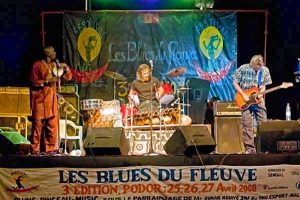
Podor, Senegal. Baaba Maal’s Blues de Fleuve Festival. Saturday night performances. L to R: Massamba Diop, Tony Vacca, and John Sheldon of World Rhythms. Shelley Cryan photo
Vacca, who first visited West Africa in 1972, jokingly calls himself a “rhythm nomad,” and he’s created an impressive percussion kit for himself over the years, from a variety of West African (and Western) drums as well as gongs and the balafon, a gourd-resonated xylophone. Spoken word is also part of his performances, and in fact his speech is kind of a mirror of that, full of jazzy and unusual syncopations, a back-and-forth, sing-song quality that mixes fun, laughter, and seriousness.
For instance, in his interview with the Advocate, he was describing plans to film a video of the recording of a song he’s co-written with some of his Senegalese friends, “You and Me and All Humanity,” a tune that evokes the spiritual and poetic connections people share, and how those connections can help forge a more peaceful world. He suggested the song was something in the spirit of “We Are The World,” the 1985 record featuring many Western pop musicians that was made for African famine relief.
Vacca noted that “We Are The World” has come in for criticism over the years for being sentimental or trite, among other things, but he quickly fired back: “OK, tell you what — you go make a song, you get the whole pop world to join you, you put that song out, you put tears and love in people’s eyes and hearts, you raise money to help people. And after you do, get back to me on how hokey that was, because until you do, shut up!”
He laughed and added, “I mean, you’re cracking on that? You got lame songs coming at you a mile a minute — go crack on that!”
Mamadou Ndiaye, who now lives in Northfield but met Vacca in Senegal in 1998 at age 22 when he was first singing in the young hip-hop influenced group Gohk-Bi System, calls his friend “just a great guy and a great musician. He has so much energy, so positive … he’s so dedicated to sharing what he’s learned with others. It is always fun to see him play.”
And Ndiaye, who has been part of the Senegal-American Project for years, says he’s been happy to take part in visits to U.S. schools with Vacca and other Senegalese musicians and artists “to share our work, our music, and our culture. That’s very important to us … that’s a good opportunity Tony helped give us.”
Vacca has a basic term for all this: global citizenship. “It’s all about recognizing the way we’re connected and using music and art and poetry, all of that, to bring about transformational moments.”
Just a kid from Jersey
If that sounds a little ephemeral or pie in the sky, consider this story: Vacca relates how a middle school he visited in Fairfield, Connecticut, a number of times in the early 2000s got so interested in making a connection itself to Senegal that, for a number of years, it sent 10 students, 10 parents, and two teachers at a time to the country to hear music, visit schools and other sites, and meet with Senegalese teachers and others. As part of those visits, students, teachers and parents raised money in the U.S. to buy and help distribute 3,000 mosquito nets in the country to help combat malaria.
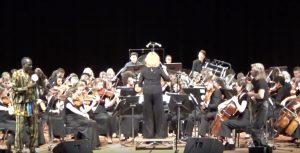
Massamba Diop, far left, and Tony Vacca, at right, play the tama — the Senegalese “talking drum” — with the Charlottesville High School String Orchestra in Charlottesville, Virginia. The group played excerpts from the soundtrack of “Black Panther.” Courtesy photo
“There was just a giant explosion of goodwill all around,” said Vacca, whose World Rhythms Ensemble played in Senegal at the time in a benefit concert to raise additional monies for health and education. “That’s when I saw that the music was the doorway to global citizenship, and that music could also be the engine of philanthropy.”
Some of the West African musicians he’s championed are also finding new avenues for their work here. Massamba Diop, who plays the tama, Senegal’s version of the “talking drum” — it’s a small instrument players cradle underneath one of their arms to play — can be heard playing his tama throughout the soundtrack of Black Panther, the acclaimed 2018 superhero movie that featured a mostly African-American cast. Diop has also played or recorded with artists such as Herbie Hancock and Peter Gabriel.
Also part of the film’s soundtrack was the singing of Baaba Maal, a legendary Senegalese Afro-pop singer who back in the 1990s became one of Vacca’s earliest musical links to the country.
All of this was very far in the future when Vacca was growing up in Kearny, just outside Newark, New Jersey (Vacca sometimes likes to put on a New Chursey accent for laughs and talk about his hometown’s connections to the popular TV series The Sopranos, for which numerous scenes were filmed in Kearny). But music was always a big part of his childhood, he notes — he grew up hearing jazz, swing and other popular music at home — and by 12 he was playing drums pretty seriously.
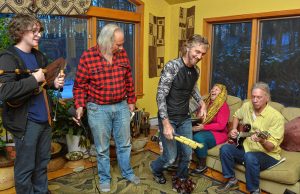
Tony Vacca, center, talks with Adrian Dickinson, from left, Paul Richmond, I-Shea and John Sheldon during a practice at Vacca’s home in Whately, Thursday, Dec. 12, 2019. Jerrey Roberts photo
At 15, when his family lived in southern California for a few years in the mid 1960s, he was playing in a high school jazz band that toured other schools in the region. He also became part of a musical/theatrical troupe led by Don and Toby Bluth (Don Bluth later became an animator for Disney and directed the seminal 1982 animated film The Secret of NIMH) that he says first opened his eyes to the possibilities of mixing music with other artistic elements.
Vacca cut his musical teeth as well in some rock and rock bands, playing cuts by The Beatles, The Rolling Stones, and other groups of the era, and he started listening to and playing the music of John Coltrane, Miles Davis, Rahsaan Roland Kirk, and other new figures in jazz. At UMass, though, he was more focused on gymnastics — the school had a powerhouse team at the time — and his studies.
Yet it was a class he took as a junior, “Cultures of West Africa,” that ultimately brought a new focus to his music. The class was taught by anthropologist Johnnetta Cole, who later became the first female African-American president of Spelman College.
“She was reading my papers, and she liked the way I was connecting the music I was listening to the history and culture [of West Africa], and she said ‘Tony, you gotta go to Africa,’” Vacca said with a laugh. “She was serious. She even gave me a book about hitch-hiking there.”
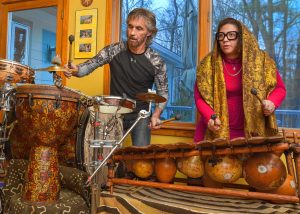
Tony Vacca plays various percussion instruments as I-Shea plays balafon at Vacca’s home in Whately. Jerrey Roberts photo
Ultimately, he did just that — after getting his parents’ blessing — doing a six-month “walkabout” in 1972 in Ghana, Senegal, Mali, and Mauritania after starting from Tunisia and crossing the Sahara Desert by truck. “In retrospect, the universe was kind of pointing the way for me, and lucky for me, I listened,” he said.
A number of other trips would follow over the next decade, during which he soaked up some of the musical traditions of Senegal in particular and took up the balafon and other instruments, all of which became part of his playing in the United States.
He made a deeper connection to Senegal in the mid 1990s when he and his ensemble were asked to play an opening set at the Iron Horse in Northampton for Baaba Maal and his band, then making one of their first trips to the states. Massamba Diop was a key drummer for Maal, and Vacca says he and Diop hit it off in the soundcheck for the gig, giving each other a friendly challenge to see what each could do on drums.
Baaba Maal, who was listening in, later said “‘Tony, you have to come to Senegal,’” said Vacca. “I thought he was being nice, but he was serious … I saw him play about three months later in Boston, and he says, ‘Tony, how come you haven’t come to Senegal?’ So this time I went … I stayed with him in his house that first trip.”
Like the famous last line of Casablanca, for Vacca this was “the beginning of a beautiful friendship” with Maal, Diop, and other Senegalese players. Among the early highlights was Vacca playing in a concert that was being televised live to the nation — but not realizing it until a day or so later when people began coming up to him in a market in Dakar, Senegal’s capital, and saying his name. He also met Mamadou Ndiaye, then one of the young singers of Gohk-Bi System, which fused hip-hop with traditional Senegalese rhythms.
John Sheldon, who has played in recent years with Vacca, Paul Richmond, and bassist Joe Sallins in the improvisational group Do It Now, said Vacca’s done a good job of bringing attention to Senegalese musicians. “Tony really makes connections … I’ve been able to play with a number of [the musicians] myself.” In fact, Sheldon joined Vacca for one of his trips to Senegal, in 2008, and has good memories in particular of trading guitar riffs with Baaba Maal; he’s also played with some of the artists here in the Valley.
The good vibes he felt in Senegal led Vacca to propose to Massamba Diop that he join him in America as part of the Senegal-America project, and the two friends have been at it ever since. Along the way have been some other good turns, like a man he met after a concert in Philadelphia who offered to fund some of his trips to Senegal, and grants from the U.S. embassy in Dakar that are dedicated to cultural exchange efforts such as the Senegal-America Project.
And former Northampton Mayor Clare Higgins and current Mayor David Narkewicz have exchanged letters of friendship with the mayors of Pikine, a section of Dakar where many musicians come from, to express their support for the musical exchange. The project has also gotten press coverage in Senegal, and the musicians of both countries have and continue to play concerts together.
Vacca says on the current trip, the American artists have also been invited by Senegal’s minister of urban education, and the mayor of one of Dakar’s “toughest boroughs,” to create “school-to-school, and artist-to-artist collaborations” between Senegal and America.
“I feel I’ve been so blessed,” says Vacca. “It all becomes a circle — we can help each other, we can teach world music, rally for education and health and less violence, and develop connections in troubled times.
“Now, I’m not trying to present this as troubled times with a capital T,” he adds. “I’m pretty sure there’s been troubled times every time, all through my life. And I don’t see it so much as a troubled world, but more as troubles to be addressed, to be fixed. And this is how we’re gonna do it.”
Tony Vacca’s website is tonyvacca.com.
Steve Pfarrer can be reached at spfarrer@valleyadvocate.com.

